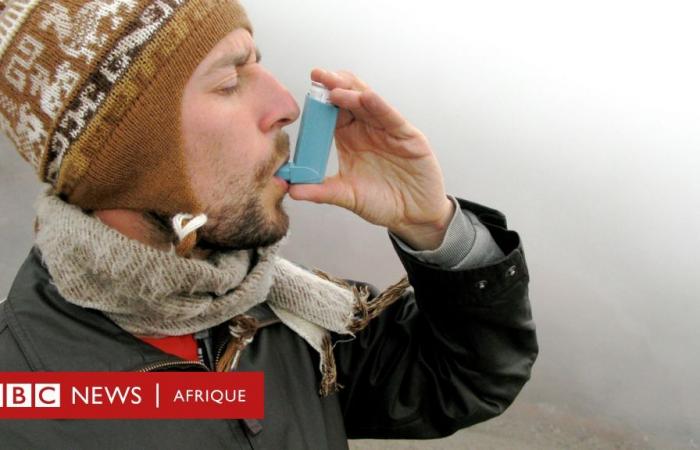Photo credit, Getty Images
Researchers claim to have discovered the first new treatment for asthma attacks in 50 years.
The injection dampens part of the immune system that can go into overdrive during flare-ups of asthma and a lung disease called chronic obstructive pulmonary disease (COPD).
The benralizumab is already used in the most serious cases, but latest research suggests it could be used routinely for around two million seizures in the UK each year.
The research team from King’s College London said the drug was a game-changer and could “revolutionize” care.
These results stem from the observation that not all asthma or COPD attacks are the same. Rather, different parts of the immune system overreact in different patients.
“Now that we know there are different patterns of inflammation, we can be smarter and deliver the right treatment, to the right patient, at the right time,” said Professor Mona Bafadhel, from King’s University.
Benralizumab targets a type of white blood cell – called an eosinophil – that can cause inflammation and damage in the lungs.
Eosinophils are involved in approximately half of asthma attacks and a third of COPD flare-ups.
If such an attack – which results in difficulty breathing, wheezing, coughing and chest tightness – cannot be controlled using a regular inhaler, then doctors prescribe a course of steroids.
The study, involving 158 people, followed patients for three months after treatment for a flare-up.
The results published in The Lancet Respiratory Medicine report a treatment failure rate of:
- 74% with steroids
- 45% with the new therapy.
People treated with the new therapy were less likely to be admitted to hospital, need another round of treatment or die.
Professor Bafadhel said this treatment could benefit a very large number of people, as two million attacks a year “is not a small number”.
“This is a radical change, because the treatment has not been changed for 50 years. It will revolutionize the way we treat people who are really sick,” said Professor Bafadhel.
The volunteers also reported an improvement in their symptoms and quality of life with the new drug.
Photo credit, Alison Spooner
Alison Spooner, 55, from Oxfordshire, is one of the trial participants. She has suffered from asthma since childhood, but it has gotten worse over the past five years and she has had three major attacks.
“They seemed to get worse, the severe shortness of breath was quite scary when you were panting and there was nothing to pant for,” she told me.
Alison says she felt “radically different” after the injection and still uses her inhalers, but “only because I was asked to”.
“Unfortunately, there is no medication that will completely get rid of asthma, but this is the closest we can get. It’s a bit of a miracle actually,” she adds.
‘A big promise’
Benralizumab is not ready for large-scale use.
A larger trial will still be needed, which should begin in 2025 and last two years, to be certain of any benefit. People who are already receiving these medications should continue to follow their prescription.
This study will also need to assess cost-effectiveness, because monoclonal antibodies, like this therapy, are expensive drugs.
Dr Sanjay Ramakrishnan of Oxford University, however, said the work done so far was extremely promising and that the treatment of COPD was “stuck in the 20th century”, despite it being one of the leading causes of death worldwide.
Photo credit, Geoffrey Pointing
Long-term use of steroids is linked to side effects such as weight gain, diabetes, and bone fragility.
Geoffrey Pointing, 77, from Oxfordshire, who also took part in the trial, said: “I didn’t have any side effects like I did with the steroid tablets: ‘I don’t Didn’t have any side effects like I did with steroid pills.
“I used to never sleep well the first night I took steroids, but on the first day of the study I was able to sleep the first night and was able to continue living with no problem.
An estimated four people with asthma and 85 people with COPD die every day in the UK.
Dr Samantha Walker, of the charity Asthma + Lung UK, said the results were “great news”.
“But it is dismaying that this is the first new treatment for people with asthma attacks and COPD in 50 years,” she said.






